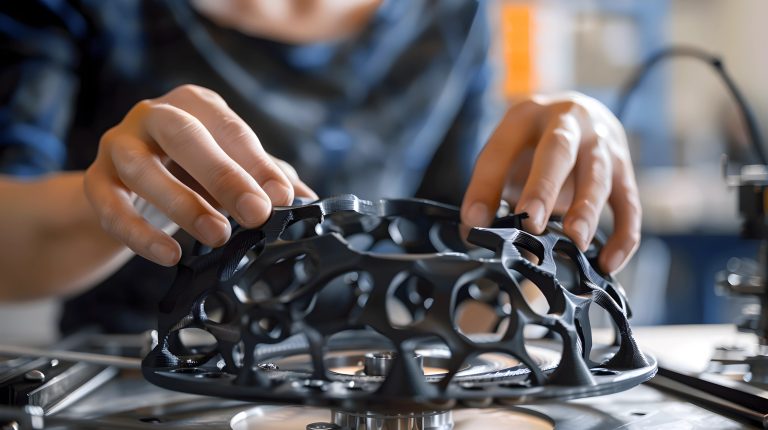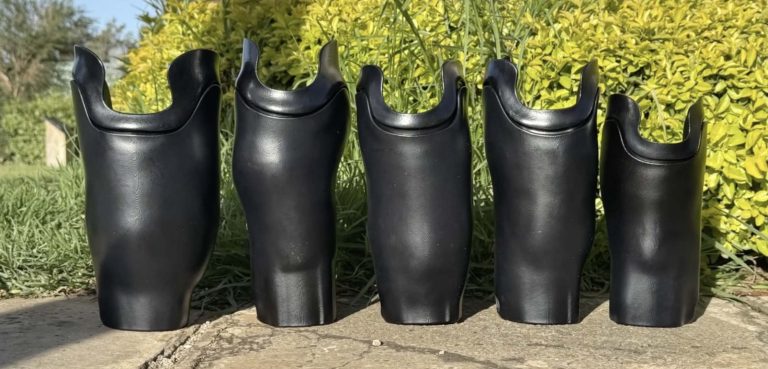The future of healthcare is no longer just about treating illnesses; it’s about transforming the way we approach treatment, healing, and recovery. And at the forefront of this transformation is additive manufacturing, or 3D printing, leading the way with innovative solutions.
In fact, 3D printing is transforming the way we think about medicine entirely — speeding up production, reducing costs, and providing solutions that are uniquely customized for patients. With 3D printing, the boundaries of possibility are expanding faster than ever. From personalized prosthetics to complex surgical tools to the potential for printing organs, the possibilities of 3D printing in medicine are vast. ABCorp 3D is proud to play a role in this transformation, providing cutting-edge solutions like custom-fit helmets, prostheses, and much more.
In this blog, we explore how additive manufacturing is reshaping the medical field and how ABCorp 3D’s offerings are helping to lead the way.
Custom Implants and Prosthetics: Tailored for the Patient
Imagine a world where no two prosthetics are the same, each one uniquely crafted to fit the patient’s anatomy. Thanks to 3D printing, this is now a reality. What once took months to develop can now be completed in just a fraction of the time. Custom prosthetics, such as limb replacements and meniscus implants, can be designed to fit the patient perfectly, enhancing both function and comfort — two crucial characteristics of a prosthetic.
In addition to prosthetics, custom-fit helmets are available, providing the highest level of comfort and protection for patients, whether for post-surgery recovery or other medical needs. The precision in our designs not only enhances comfort but also accelerates recovery and leads to better outcomes for the patients we service. With devices and implants tailored specifically to each individual, patients can feel confident knowing that their product is designed for their unique body, improving quality of their life, and reducing the risk of complications, not to mention granting them the confidence they deserve. At ABCorp 3D, we specialize in creating these personalized solutions to support patient well-being.
Faster Turnarounds, Lower Costs
In the world of healthcare, time is of the essence, meaning the manufacturing process of 3D printed designs must be fast-paced. Waiting weeks for a critical medical device is often not an option; 3D printing speeds up the process, allowing us to deliver solutions on-demand. With the ability to produce high-quality medical devices and implants quickly, healthcare providers can provide immediate relief to patients.
However, this isn’t just about speed — it’s also about cost-effectiveness. Traditional manufacturing methods can be extremely costly, often requiring large inventories and long production times. But with additive manufacturing, we’re able to reduce the need for excess inventory, cut down on production time, and pass on those savings to healthcare providers and patients. Whether it’s custom prostheses or protective helmets, 3D printing makes high-quality healthcare solutions more affordable and accessible.
Bioprinting: The Future of Personalized Medicine
Looking further into the future of healthcare, 3D bioprinting offers the promise of creating organs and tissues tailored to the individual. While we may not yet be able to print full organs, the potential to produce life-saving implants or even repair damaged tissues using a patient’s own cells is rapidly advancing. Bioprinting will significantly reduce the risk of organ rejection and make organ transplants faster, more affordable, and more successful. In fact, for the past few years, NASA has been conducting research on the International Space Station to hopefully bring this to fruition sooner.
At ABCorp 3D, we’re committed to following these advancements and exploring how we can support bioprinting technologies, creating more effective and personalized treatments for patients. We envision a world where organs, like hearts or kidneys, are no longer in short supply but available on-demand, custom-designed for the individuals who needs them.
Customization Meets Affordability: A New Standard for Healthcare
Additive manufacturing in healthcare means that customization is no longer a luxury, it’s the new standard. Gone are the days of “one-size-fits-all” medical solutions. At ABCorp 3D, we’re redefining the way we approach medical products, from helmets to prosthetics, by delivering high-quality, custom-fit solutions faster and at a fraction of the cost of traditional methods.
This approach doesn’t just benefit patients — it transforms the healthcare system by reducing waste, lowering costs, and increasing the efficiency of medical treatment. With faster, more affordable production, patients receive the care they need when they need it, without the long wait times or prohibitive costs that once defined medical procedures.
A Future Shaped by 3D Printing
3D printing has been making incredible strides in the medical field since as early as 1999. One groundbreaking example is the Wake Forest Institute for Regenerative Medicine’s successful 3D printing of a bladder, which was then covered with the patient’s own cells and implanted. Remarkably, as of 2018, the bladder continued to function perfectly, showcasing the immense potential of 3D printing in transforming healthcare.
The possibilities of additive manufacturing in medicine are endless. From custom prosthetics to bioprinted organs, 3D printing is changing how we approach healthcare and treatment. As we continue to push the boundaries of what’s possible, we’re shaping a future where personalized, cutting-edge healthcare is available to everyone.
 The future of healthcare is brighter than ever thanks to 3D printing, with innovations that offer faster turnaround times, more affordable solutions, and life-changing customization for patients. At ABCorp 3D, we are excited to be leading the way in this transformation, offering cutting-edge medical solutions that not only improve patient outcomes but also make high-quality healthcare more accessible.
The future of healthcare is brighter than ever thanks to 3D printing, with innovations that offer faster turnaround times, more affordable solutions, and life-changing customization for patients. At ABCorp 3D, we are excited to be leading the way in this transformation, offering cutting-edge medical solutions that not only improve patient outcomes but also make high-quality healthcare more accessible.


 The future of healthcare is brighter than ever thanks to 3D printing, with innovations that offer faster turnaround times, more affordable solutions, and life-changing customization for patients. At ABCorp 3D, we are excited to be leading the way in this transformation, offering cutting-edge medical solutions that not only improve patient outcomes but also make high-quality healthcare more accessible.
The future of healthcare is brighter than ever thanks to 3D printing, with innovations that offer faster turnaround times, more affordable solutions, and life-changing customization for patients. At ABCorp 3D, we are excited to be leading the way in this transformation, offering cutting-edge medical solutions that not only improve patient outcomes but also make high-quality healthcare more accessible.
